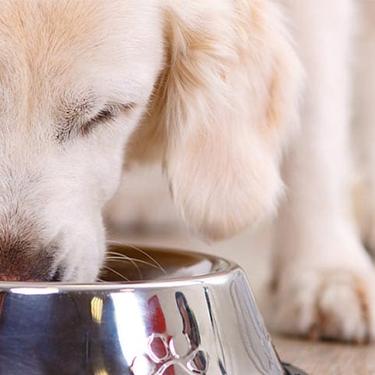
-
Find the right food for your pet
Take this quiz to see which food may be the best for your furry friend.
Find the right food for your pet
Take this quiz to see which food may be the best for your furry friend.
Featured products
 Small & Mini Savory Stew with Chicken & Vegetables Dog Food
Small & Mini Savory Stew with Chicken & Vegetables Dog FoodA delicious complement to the nutrition of Science Diet Small & Mini 7+ dog food
Shop Now Adult 7+ Perfect Digestion Chicken, Whole Oats & Brown Rice Recipe Dog Food
Adult 7+ Perfect Digestion Chicken, Whole Oats & Brown Rice Recipe Dog FoodScience Diet's breakthrough nutrition supports ultimate digestive well-being & healthy microbiome for dogs age 7+
Shop Now Adult Healthy Cuisine Roasted Chicken, Carrots & Spinach Stew Dog Food
Adult Healthy Cuisine Roasted Chicken, Carrots & Spinach Stew Dog FoodDelicious roasted chicken paired with tender vegetables in a succulent stew
Shop NowFeatured products
 Adult 7+ Senior Vitality Chicken & Vegetable Stew Cat Food
Adult 7+ Senior Vitality Chicken & Vegetable Stew Cat FoodImproves Everyday Ability to Get Up & Go
Shop Now Adult 7+ Tender Tuna Dinner Cat Food
Adult 7+ Tender Tuna Dinner Cat FoodWith delicious chunks in a decadent gravy
Shop Now Adult Savory Entrée Can Variety Pack Cat Food
Adult Savory Entrée Can Variety Pack Cat FoodPrecisely balanced nutrition with the delicious taste of savory minced chicken to help fuel the energy needs of cats during the prime of their life
Shop Now -
Dog
- Dog Tips & Articles
-
Health Category
- Weight
- Food & Environmental Sensitivities
- Urinary
- Digestive
- Joint
- Kidney
-
Life Stage
- Puppy Nutrition
- Adult Nutrition
- Senior Nutrition
Cat
- Cat Tips & Articles
-
Health Category
- Weight
- Skin & Food Sensitivities
- Urinary
- Digestive
- Kidney
-
Life Stage
- Kitten Nutrition
- Adult Nutrition
Featured articles
 Does My Pet Hate Me?
Does My Pet Hate Me?Learn tips for bonding with your pet if you've ever thought, 'My dog doesn't like me, or 'Why do I have a standoffish cat?'
Read More Do Dogs and Cats have Belly Buttons?
Do Dogs and Cats have Belly Buttons?Learn whether cats & dogs have belly buttons like humans, what the function is, and if there are any health concerns associated with it.
Read More Why Are Dogs and Cats So Cute?
Why Are Dogs and Cats So Cute?If waggy puppy dog tails and furry kitten yawns make you swoon, you're not alone. Why are cats so cute? And, dogs too! Let's find out!
Read More -


Periodontal disease in dogs (aka gum disease) is a significant health concern. By the time they're 3 years of age, gum disease affects a majority of canine companions. Although there are usually no symptoms at first, periodontal disease can destroy the teeth, gums and jaw of your dog as it progresses.
Although periodontal disease is common in dogs, it can be treated and sometimes even prevented altogether.
What Is Periodontal Disease in Dogs?
This type of disease affects the structures in the mouth that surround and support teeth — known as periodontal tissues. For dogs, the culprit of periodontal disease is bacteria.
After a dog eats, bacteria start eating any food particles left in their mouth and form a sticky, white-grayish film called plaque. Bacteria in plaque are immediately recognized by your dog's immune system as foreign invaders, and once that happens, their body sends white blood cells to eliminate the invasion. However, if the plaque is left undisturbed, it will thicken and the bacteria release toxins that can lead to:
- Inflamed or red gums (gingivitis)
- Gum loss
- Loss of bone around the teeth
- Tooth loss
Does Periodontal Disease Have Any Complications?
Yes. One complication of periodontal disease is jaw fracture. Over time, inflammation caused by the bacteria can eat away at the jaw bone, weakening it and leading to pathologic fractures (meaning a fracture caused by disease rather than injury). This is especially common in small and toy breed dogs.
Another complication is the formation of an oronasal fistula, an irregular opening between the mouth and the nasal cavity caused by tissue erosion. Also, stemming from inflammation, this periodontal disease complication can lead to chronic nasal discharge and infections.
Bacteria in the mouth can also enter a dog's bloodstream and land in their kidneys, heart and liver. This can cause increased wear and tear on their internal organs and potentially prompt other health problems.

What Are the Signs of Periodontal Disease in Dogs?
Some early signs of gum disease in dogs may include bad breath, tartar (mineralized plaque) on the teeth and a line of red inflammation along the gumline. Unfortunately, the first signs of periodontal disease in dogs are rarely observed by pet parents. By the time the signs are noticeable, gum disease has typically advanced and is painful for a pet.
As the disease progresses, your dog can experience a number of effects including:
- Bleeding or red gums
- Bloody saliva
- Loose teeth
- Lumps in the mouth or under the eyes
- Receding gums
- Nasal discharge or sneezing
Additionally, your dog may have difficulty picking up food, drop food from their mouth or start to chew on one side. They may also become shy and indicate that they don't want to be touched on the head.
How Is Periodontal Disease Diagnosed?
Through an oral exam, a veterinarian will be able to see many of the signs of periodontal disease, such as red gums, plaque and tartar buildup, and tooth loss or mobility. However, if your vet suspects periodontal disease may be in play, they'll recommend your dog undergo a dental cleaning and an X-ray under general anesthesia to fully assess their oral health.
It's a good idea to have your dog examined regularly, between once or twice a year, by a vet for periodontal disease, as early treatment may be able to preserve your pet's teeth. If your vet recommends dental care, follow their recommendations, even if your dog is acting normally.


Tasty Tips
Is Periodontal Disease in Dogs Preventable?
You can safeguard your dog against gum disease by following a few vet-recommended strategies.
For starters, dogs — just like humans — can benefit from having their teeth brushed twice a day. Brushing helps reduce plaque and bacteria buildup. It's easy to train most dogs to embrace having their teeth brushed. Some pets even grow to love it, as long as it's a gentle process.
Offer your dog tooth-friendly chew toys to play with. Thin, bendy chew strips and soft rubber chews are good choices. Avoid hard chew toys like antlers, hooves, bleached bones or tennis balls. When in doubt, ask your vet if a toy is a safe choice.
How Is Periodontal Disease Treated?
Periodontal disease in dogs is treated the same way gum disease is treated in humans — with a complete cleaning and removal of all the plaque and tartar from the teeth.
The safest and least stressful way to clean above and below the gumline is with your dog under anesthesia. This also allows the vet to completely examine the mouth; remove any loose, broken or infected teeth; and take dental X-rays. If they note an infection in your dog's gums, they may prescribe antibiotics and pain medication.
How Does Nutrition Affect the Likelihood of Gum Disease in Dogs?
Good oral and gum health starts with a healthy body and immune system. As such, feeding your canine companion a quality dog food that's complete and balanced may help deter the common culprits of periodontal disease.
Foods like Hill's Science Diet Adult Oral Care are specifically formulated to help promote healthy teeth and gums. If your dog has problems with plaque and tartar buildup, talk to your vet about therapeutic dental foods like Hill's Prescription Diet t/d that may help reduce plaque and tartar accumulation.
Even though dental diseases are common in dogs, they don't have to be a problem for your pet. By being proactive and working with a veterinarian who can help you manage your dog's oral health, you can ensure your canine friend keeps their sparkling smile well into their golden years.


Dr. Sarah Wooten graduated from UC Davis School of Veterinary Medicine in 2002. A member of the American Society of Veterinary Journalists, Dr. Wooten divides her professional time between small animal practice in Greeley, Colorado, public speaking on associate issues, leadership, and client communication, and writing. She enjoys camping with her family, skiing, SCUBA, and participating in triathlons.
Related products
Related articles

Learn about choosing the right dog food to help ensure your adult dog will receive the correct balance of nutrition.

Learn how today's wet dog food blends have gotten a face lift, and how you'll provide your dog the nutrition he needs in the form he loves.

Learn the the dangers of feeding your dog chocolate, which types are most dangerous, and what to do if you discover that they have consumed chocolate.

Proper nutrition for your pregnant or nursing dog is vital to her and her puppy's health. Learn what you should do provide her with the proper nutrients.

Put your dog on a diet without them knowing
Our low calorie formula helps you control your dog's weight. It's packed with high-quality protein for building lean muscles, and made with purposeful ingredients for a flavorful, nutritious meal. Clinically proven antioxidants, Vitamin C+E, help promote a healthy immune system.
Put your dog on a diet without them knowing
Our low calorie formula helps you control your dog's weight. It's packed with high-quality protein for building lean muscles, and made with purposeful ingredients for a flavorful, nutritious meal. Clinically proven antioxidants, Vitamin C+E, help promote a healthy immune system.

